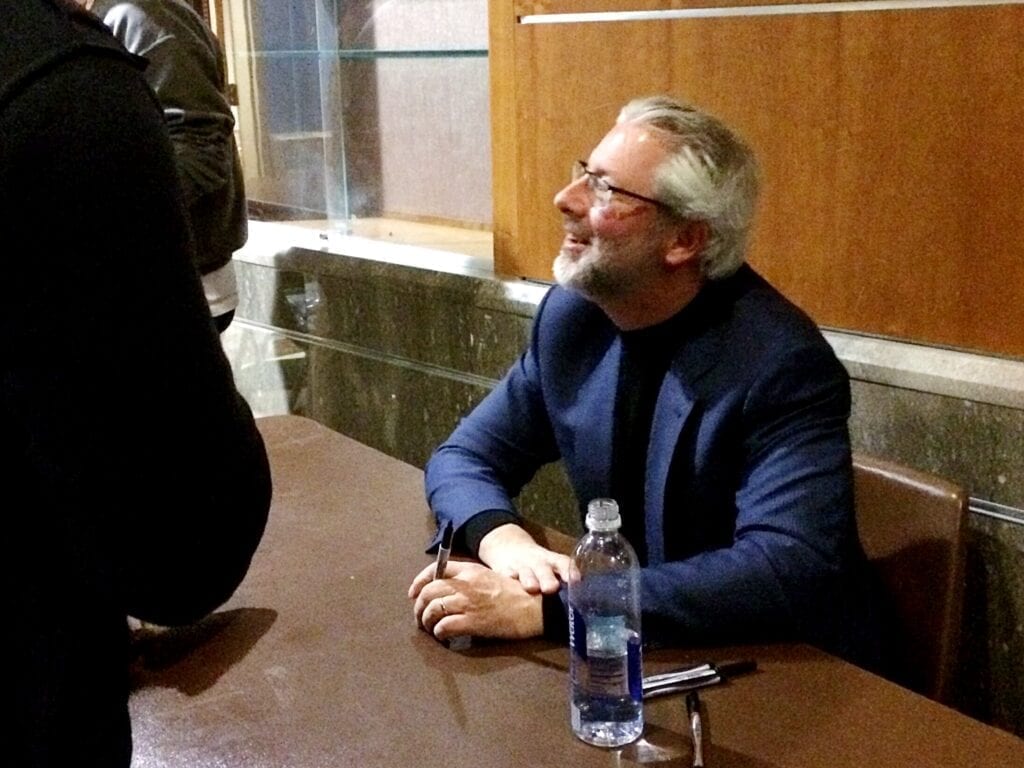Paleontologist, author discusses link between humans and fish
Dr. Neil Shubin discussed the connection between humans and fish during the lecture “Your Inner Fish,” part of McClung Museum’s annual Darwin Day celebration on Thursday.

Dr. Neil Shubin discusses the connection between humans and fish during Darwin Day celebration // Photo by Elizabeth Garrett
[title_box title=”Paleontologist, author discusses link between humans and fish”]
Humans and fish have a lot more in common than most people know, according to fish paleontologist and author Neil Shubin. On Thursday, the lecture “Your Inner Fish” explained how Shubin began his search for the fossil link between fish and land creatures and why this discovery matters today.
Shubin’s search began as a second year Ph.D. student, after his professor showed him a diagram of a fish changing to a land creature.
“It captured my imagination,” he said, “that is, to find evidence how fish, and the descendants of fish, evolved to walk on land. That became my quest in 1987 and it hasn’t changed since.”
These similarities arise from what Shubin calls “a common history with the rest of life on earth.” Scientists find these similarities when they study fossils, embryos and DNA.
“Often some of the best road maps to our own bodies lie in other creatures,” Shubin stated. “Some of the best road maps to the bones of our arms lie in fish (…) some of the basic road maps to understanding the complex tangle of nerves inside our heads lie in sharks.”
Previous scientific research conducted by Ashton Embry in the 1960s led Shubin and an expedition team to the Arctic Islands. In 2004, they uncovered what they called the Tiktaalik, a large, freshwater fish that has both land and water creature characteristics.
This discovery was monumental because the creature had the first neck in fossil records, as well as similar wrist and neck structures to those of humans. These similarities have led biologists to discover other similarities between fish and humans including embryos, muscles and nervous systems.
Such connections have greatly increased medical research to help prevent and cure diseases.
“The breakthroughs that will ultimately enrich and extend our lives will be based in some way on worms, flies and in some cases even fish,” Shubin predicted.
Shubin believes that these advances make today “a very exciting time to be a biologist.” Robert Jacobsen, sixth year Ph.D. graduate student in the Earth and Planetary Sciences department, agrees with Shubin.
“It’s exciting to have people that have made great discoveries come and share those experiences,” he said. “I feel that it’s important to expose myself to those people that are seeking truth.”
After his lecture, Shubin signed copies of his book “Your Inner Fish: A Journey into the 3.5-Billion-Year History of the Human Body,” which was published in 2008.
This lecture was held as part of the Ecology and Evolutionary Biology Department’s annual Darwin Day celebration, which ran from Feb. 9 to Feb. 11.
Featured image by Elizabeth Garrett
Edited by Hannah Hunnicutt
Elizabeth is a senior majoring in English, Technical Communications and minoring in Journalism and Electronic Media.

